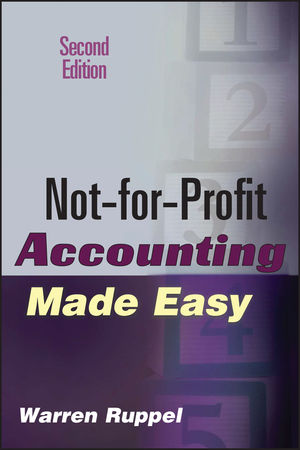Not-for-Profit Accounting Made Easy, 2nd EditionISBN: 978-0-471-78979-6
Hardcover
256 pages
April 2007
 This is a Print-on-Demand title. It will be printed specifically to fill your order. Please allow an additional 15-20 days delivery time. The book is not returnable.
|
||||||
Preface ix
Chapter 1 Understanding the Basics of Not-for-Profit Accounting 1
What Are Generally Accepted Accounting Principles? 1
Why Is Preparing GAAP Financial Statements Important? 2
Definitions and Examples of Assets, Liabilities, Reve nues, and Expenses Usually Found in Not-for-Profit Organizations’ Financial Statements 6
What Is Meant by the Accrual Basis of Accounting? How Does This Differ from the Cash Basis of Ac- counting, and Which Is Better? 36
What Happened to Fund Accounting? 40
Summary 42
Chapter 2 Basic Financial Statements of a Not-for-profit Organization 43
Statement of Financial Position 44
Statement of Activities 46
Statement of Cash Flows 56
Summary 63
Chapter 3 Accounting for Contributions 65
When Should Contributions Be Recorded? 66
Understanding the Impact of Donor Restrictions on the Reporting of Contributions 72
Accounting for Contributed Services 74
Accounting for Other Noncash Contributions 75
Pass-Through Contributions 76
Summary 82
Chapter 4 Accounting for Investments and Financial Instruments 83
Accounting for Investments 84
Accounting and Financial Reporting for Financial Instruments 98
Summary 107
Chapter 5 Accounting for Activities with Joint Costs and Indirect Cost Allocation 109
Accounting for the Costs of Activities that Include Fund-Raising 110
Allocation Methods 117
Indirect Cost Allocation Plans 119
Summary 124
Chapter 6 Affiliated Organizations 125
Affiliated Organizations 126
For-Profit Subsidiaries 135
Related-Party Disclosures 137
Summary 140
Chapter 7 Collections 141
What Is a Collection? 142
Accounting for Collections 143
Summary 146
Chapter 8 Split-Interest Agreements 147
Accounting Fundamentals 148
Revocable Split-Interest Agreements 149
Irrevocable Split-Interest Agreements 150
Examples of Split-Interest Agreements 153
Summary 158
Chapter 9 Accounting for Pension and Other Postretirement Employee Benefit Plans 159
Accounting for Pension Plans 160
Determining Pension Expense 164
Determining Pension Liability 165
Actuarial Assumptions and Calculations 168
Required Disclosures 171
Deferred Compensation Plans 172
Other Postretirement Benefits 173
Disclosures 176
Summary 177
Chapter 10 Lease Accounting Fundamentals 179
Lease Accounting 180
Operating versus Capital Leases 180
Operating Leases 185
Operating Leases with Scheduled Rent Increases 187
Free Rent Periods 188
Capital Leases 189
Summary 193
Chapter 11 Analyzing the Financial Health of Not-for-Profit Organizations 195
Financial Statement Analysis 197
Independent Auditor’s Report 197
Comparative Financial Statements 201
Functional Expense Ratios and Other Analyses 203
Budget Considerations in Financial Analysis 213
Relation of the Budget to the Financial Statements 214
Methods of Budgetary Control 216
Summary 218
Chapter 12 Current Developments in Not-for-Profit GAAP 221
Recent FASB Statements 222
Summary 228
Index 229



